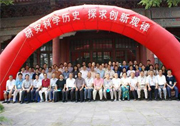| 中文题目: | 1047年北宋宫廷祈雨的诸相 | ||||||
| 英文题目: | On Implications of Praying for Rain in the Royal Court of the Northern Song Dynasty in 1047 | ||||||
| 作 者: | 谢智飞 | ||||||
| 刊物名称: | 农业考古 | ||||||
| 发表年度: | 2020 | ||||||
| 卷: | |||||||
| 期: | 1 | ||||||
| 页码: | 235-242 | ||||||
| 中文摘要: | 本文以1047年发生在北宋宫廷内的一场祈雨祭祀为研究对象,运用"剧场国家"理论,描绘了祈雨的"展演"相与"权力"相,研究了祈雨期内以展演为表征、以权力为暗流的人神、人地、人人关系。研究发现:一方面,祈雨是充满象征意义的展演式活动,祈雨人宋仁宗需要向天神与黎民展演德行,而展演德行又需借助于气象技术;另一方面,贾昌朝被罢相是多重因素作用下的结果,罢相反映出北宋中期朝廷内激烈的政治纷争,其仍为庆历新政后权力博弈的延续。可见这场祈雨是一场德行的展演,也是实在的操纵帝国的权力之争。 | ||||||
| 英文摘要: | Based on "Theater State" theory, the paper offers a new insight into praying for rain by tracing the history of a pray-for-rain event in the royal court of the Northern Song Dynasty in 1047. The divine-human, man-land and man-man relations characterized by performance and power during the pray-for-rain period are explored. The implications of praying for rain are found as follows: On the one hand, as praying for rain was a symbolic performance activity, Emperor Renzong as a prayer was required to show his virtues to the gods in the heaven and the common people, which was assisted by meteorological technology. On the other hand, Jia Changchao’s dismissal from the post of prime minister was a result of multiple factors. This dismissal during the pray-for-rain period reflected the sharp political struggle in the royal court in the mid-Northern Song Dynasty, which was affected by the Qingli Reform. It concludes that praying for rain was not only a virtue performance but also an act of showing power of manipulating the empire. | ||||||





